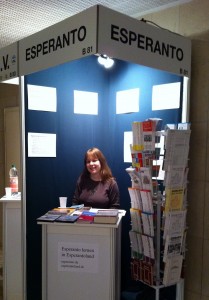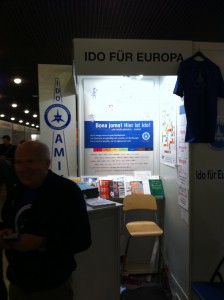Presenting Esperanto at Expolingua Berlin Posted by Chuck Smith on Dec 3, 2010 in Uncategorized
On November 19-21, we had our annual language fair in Berlin, Expolingua! There were 200 exhibitors from over 30 countries and more than 12,000 visitors in 3 days. There you could find stands from language schools, travel agencies, exchange organizations, cultural institutes, etc. On the side, there is also a seminar program (PDF. mostly German) including mini language courses, information on learning languages abroad, translation work, etc.
Every year we have an Esperanto stand there and it’s quite a lot of work! This year we had 3 people set up the stand, 8 people presenting at the stand, and several people to tear it down at the end… and then we have to pay for the booth as well! A few months leading up to the event, we always have a discussion as to whether it’s worth the money and time it takes to run it, but there really is no better venue in Berlin in which to promote our language, so we’re there. We also discussed whether we wanted to put an organization name on the booth, but in the end decided that our ultimate goal is just promoting Esperanto and not any particular institution, so we finally settled for just “Esperanto”.
It’s also a great way to timely draw people to the weekend Esperanto course (in German) that we offer at the Esperanto House in Berlin. A local Folk High School is also offering their own Esperanto course next year, so we told visitors of that possibility as well. For a retema vizitanto (Internet-inclined visitor), we also gave links to the famous multi-lingual lernu! course as well as the more traditional Kostenloser Esperanto-Kurs (somewhat similar to the English: Free Esperanto Course)
Another reason to represent Esperanto at Expolingua is because the Deutsche Ido Gesellschaft – Ido Freunde Berlin (German Ido Society – Berlin Ido Friends) is always there. Wikipedia estimates that there are 100-200 Ido speakers in the world. Despite its small amount of speakers, if they were present and Esperanto were not, that would give a rather strange impression to the public. As far as I know, this is the only fair where I sometimes have to answer questions like, “How is Esperanto better than Ido?” which quite surprised me the first time I heard it!
In any case, if you ever get a chance to represent Esperanto at a fair, I’d highly recommend it! It’s quite an interesting way to hear the opinions of strangers about a subject typically quite foreign to them, yet near to you. You’ll be challenged in many ways and be able to tell others about your experiences with Esperanto: meeting new foreign friends, visiting strange lands and reading its unique literature. I plan to expand later on tips for presenting Esperanto to others in future blog posts, so keep reading!

Build vocabulary, practice pronunciation, and more with Transparent Language Online. Available anytime, anywhere, on any device.
About the Author: Chuck Smith
I was born in the US, but Esperanto has led me all over the world. I started teaching myself Esperanto on a whim in 2001, not knowing how it would change my life. The timing couldn’t have been better; around that same time I discovered Wikipedia in it’s very early stages and launched the Esperanto version. When I decided to backpack through Europe, I found Esperanto speakers to host me. These connections led me to the Esperanto Youth Organization in Rotterdam, where I worked for a year, using Esperanto as my primary language. Though in recent years I’ve moved on to other endeavors like iOS development, I remain deeply engrained in the Esperanto community, and love keeping you informed of the latest news. The best thing that came from learning Esperanto has been the opportunity to connect with fellow speakers around the globe, so feel free to join in the conversation with a comment! I am now the founder and CTO of the social app Amikumu.






Comments:
russ:
Tre bone! Dankon pro la laboro. Ŝajnas, ke vi prave reklamis Esperanton mem anstataŭ iu specifa grupo.
PS: Tre utilas la libro “Esperanto sen mitoj” pri bonaj kaj malbonaj manieroj prezenti Esperanton al la publiko.
chucksmith:
Nedankinde! Vi eble cetere ankaŭ ŝatus scii ke Ziko verkis plian libron nomata “Informado praktike”.
Aĉeteblas de UEA: http://katalogo.uea.org/katalogo.php?inf=7834
Aristophio Alves Filho:
Bonege! Gratulon!
Matjo:
Bona laboro ^^. Mi jam prezentis E-on dum 4 foiroj sed neniam estis konkurantoj (krom la angla). Kion vi respondis pri Ido?
Lu Wunsch-Rolshoven:
An interesting report. Thank you.
I think the question is not: Is it worth going to the Expolingua or not?
It is rather: If you have a certain amount of money and about 2 x 3 x 8 = 48 hours of Esperanto people in Berlin at your disposition – what would be the best to do with? a) 3 days (8 hours) in the Expolingua (2 people). b) 8 times during 3 hours (2 people) with a stand in front a university restaurant. Maybe every wednesday during 8 weeks.
I have a clear preference for the university stand. Maybe after more than 15 years in the Expolingua (and no outstanding success) we should try something else. At least in addition.
Chuck Smith:
Matjo, mi diris ke Ido estas Esperanto pli francigita. 🙂
Lu, very interesting comments. The thing is that we have helpers when it comes to having a concrete event. However, yes, it would be an interesting idea to think about having a stand near a university. However, a stand may not be the best way to promote Esperanto. Thanks for making me think about this!
Lu Wunsch-Rolshoven:
Chuck, I don’t think, the thing to be that we have (only) helpers “when it comes to having a concrete event.” I think, the thing is that we just move when something moves against us, e.g. the Expolingua. We should move before that – and think about where to move.